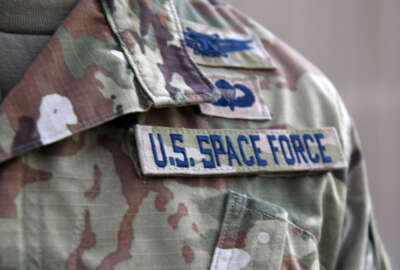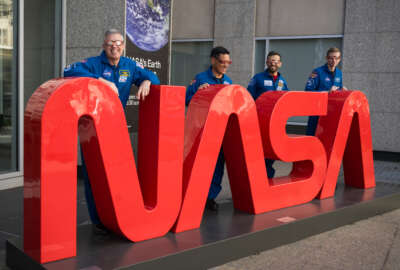NASA awards KBR with contractor of the year award
"I think we do a great job of supporting NASA's intricate missions," said Todd May, senior vice president of KBR’s Science and Space Business.
The company KBR may not be the most well-known commercial space company for those outside the business, but it’s one of the larger firms that does a ton of work with NASA — which is how it ended up being selected as NASA’s Agency-Level Large Business Prime Contractor of the Year. To find out more about the firm and what this award means for it, Federal News Network’s Eric White spoke to Todd May, Senior Vice President of KBR’s Science and Space Business on the Space Hour.
Interview transcript:
Todd May KBR is a publicly traded company on the New York Stock Exchange that provides science, technology and engineering solutions to governments and companies around the world. The company itself has been in existence over 100 years, and KBR has 36,000 employees operating in more than 30 countries around the globe and provides solutions and strategies to help solve some of the great challenges and opportunities of our time. Through our primary solution pillars is what we call home government solutions and sustainable technology solutions. We have a standard of high impact success across the board. KBR is proud to work with its customers across the globe, providing technology, value added services and long term operations and maintenance services to ensure consistent delivery with predictable results.
Eric White And what areas do you mostly concern yourself with? What do you find yourself zeroed in on as a company and in your day to day?
Todd May Sure. You know, in the space world, KBR operates in civil space, commercial space, intelligence space and DOD space today. We recently closed on a deal to acquire Lindquist, which is a Chicago-based company in the national security space area. And so we’ve now expanded our capabilities across aerospace and digital digital domains. In terms of my business, some of my largest contracts are supporting Johnson Space Center and human spaceflight. We’re responsible for training the astronauts for planning space missions, operating the space station in support of our NASA’s contract are NASA’s customers there at Goddard. We operate about a dozen satellites, including several around the lunar area. For Goddard, we have engineering capabilities across multiple spacecraft platforms at Goddard, at AFRL. We support Johns Hopkins. We also manage the largest Earth observing data archive for the USGS, the Landsat data archive, which is over 40 years old and is really the, you know, the record of land change over that period of time. You know, things like deforestation and urban sprawl and major cataclysmic events, the ebb and flow of the Antarctic and Arctic ice floes and things like that.
Eric White It’s a really diverse amount of things that you all have your hand in. And, you know, that’s not typical for aerospace companies. Even some of the larger ones tend to narrow their focus on, you know, one area, whether it’s ground control or just creating rockets themselves. How did KBR find itself in so many realms? And, you know, was it through acquisitions like the one you just mentioned, or was it just kind of, you know, opportunity struck and that was the way things went?
Todd May Well, you know, even before I joined the company in 2018, I think KBR was looking to grow into these domains. And so through a number of acquisitions, a company called SGT, owned by a gentleman named Cam Defarion. We had acquired Wiley, we had acquired Honeywell Technical, HTSI, we call it, and really, you know, had a plan to buy into those areas and acquire into those areas and really grow out a world class platform. We later had an acquisition called Centauri, which got us into the intelligence space. And of course, the Olympus acquisition has a footprint over in Space Force. And so it has been a strategic growth vector for a long time. And I’m really proud of the way the company has taken these, you know, these smaller companies and formed a really strategic and coordinated series of business units and divisions, you know, that really has domain excellence across this entire spectrum.
Eric White Yeah. It seems as if the agencies you work with share your good feeling as NASA’s recently named KBR the agency level large business prime contractor of the year. What does that mean to a company like yourself when there is that recognition? And do you think it was because of all the work that you do with NASA in so many different areas that put you on the top echelon there?
Todd May Well, I think nothing happens alone. And so I think one of the things, you know, we are successful because, you know, our partner so successful and we try to create great partnerships. And, you know, having been on the government side myself for nearly 30 years, I was always proud to, you know, to see companies achieve this level of award. But, you know, KBR has been able to sustain this kind of recognition now for a while. You know, over the last five years, we’ve won 13 of these awards, and three of those have been at the agency level. You know, I think we do a great job of supporting NASA’s intricate missions, both as a prime contractor and as a mentor to small businesses, which is a big part of how this award is considered. You know, I think it really it builds over the years. And I think our customers have seen that and they reflected in the, you know, in giving us this award. We also secured the 2023 large business prime contractor of the year at both Johnson Space Center and Goddard, which are two of the largest centers at NASA. So, you know, I think it’s a lot of hard work by our people. You know, our people are there to provide solutions to their customers, but we also recognize that we partner with a bunch of other companies. And our job is not just to be successful ourselves, but also to, you know, I kind of view it as a rising tide raises all ships.
Eric White And not to belabor the point, but just because you all are factored into so many areas, I’d love to get your take on the sort of divide that a lot of commercial space companies are having to decide. What do they want to go towards the defense side or stay in the exploration slash commercial area? What is it about both sides of that that you could see going one way or the other? And how are you all handling that decision?
Todd May Yeah, I think there are certain aspects of those segments of the business that are different. You know, you say you get into intelligent space and a very large portion of that workforce is cleared at very high levels and do things that they can’t go home and talk about it with their families and yet on. And yet they’re very smart people. These are these are very well-trained, top of their class type people, solving very difficult issues. And then on the other side, you have very similar people who are very well trained, top of their class kind of people. And they get to do things they get to tell all their neighbors about as part of. Part of NASA’s charter is to is to inspire people with what they do. And everything’s very public. So there are some very different type aspects to it and there’s some similarities. I think KBR, we you know, we’ve segmented it out and we have an entire business unit now that is in that defense and Intel space, and they’re very well focused on their customers. And I’m in the commercial and civil side and I’m very focused on those customers. But we have a workforce that actually can flow back and forth between those because a lot of the problems are similar across those backgrounds. Some are very unique as well, but we’ve been able to to manage it well. I think I think another differentiator you have to do is decide whether you want to try to be in the OEM world to be someone who’s actually making rockets and spacecraft and selling them to the government. We’ve kind of chosen to be on the side where we’re supporting those those those people and those companies, except for a few specific areas. For example, we’re teamed with Axiom helping them build the next generation spacesuits. They’re an OEM company that, because of our expertise supporting the government on their current spacesuits, we bring a particular expertise to a new space company who is kind of just getting started. So we look for those win-win partnerships.
Eric White Yeah. And what’s the point of having a cool job if you can’t tell people about it? Right. I mean, that’s the reason you get into the space sector.
Todd May Well, I think we should all be very glad that there are some people who are doing jobs they can’t tell you about when they get home, but they are keeping us safe every day. Yes, very much guardians for a reason.
Eric White Absolutely. Absolutely. And yeah, I’d like to finish up here just by getting a little bit more info on yourself. You had mentioned some of your government experience in the past. If you could just kind of fill us in on how you got here and and what you’re all looking forward to in the future.
Todd May Yeah. So I started out at NASA’s Marshall Space Flight Center and in materials and processes, after about three years, moved the Houston work Space Station program, moved back to Huntsville and kind of got in the building where we were building Node Lab and airlock, got some manufacturing experience there, jumped over to the science side work, the Discovery New Frontiers program, which is a series of of space. Craft that explore the solar system. I went up to headquarters for a while and worked in the Science Mission Directorate. Came back down to Huntsville and started the Space Launch System program, ran that for about five years, and then ran Marshall Space Flight Center and retired in 2018. So I’ve kind of been all over the agency. We’ve been providing mission critical space support services to civil military and commercial spacecraft customers for more than 60 years. We’ve had a couple of big wins in the last year or so. And, you know, we’re looking forward to continuing to support NASA, particularly as NASA evolves, particularly helping to bring on the commercial Leo Destinations activities and the lunar mission and on to Mars. We feel like we’ve got the historical expertise in these areas and are pretty keen to help our customers evolve into the future. And you know, not just NASA, but a lot of our customers are changing the way they they acquire data, for example, or commercial companies who are coming on. As I said, there are some who are really ambitious and they could use our expertise just like NASA does, to help them be successful. So, you know, we see all of this as a continued growth business market sector and look forward to doing it for decades to come.
Eric White That’s Todd May, senior vice president of KBR Science and Space Business.
Copyright © 2024 Federal News Network. All rights reserved. This website is not intended for users located within the European Economic Area.
Eric White is news anchor and Federal Drive producer at Federal News Network.
Follow @FEDERALNEWSCAST






